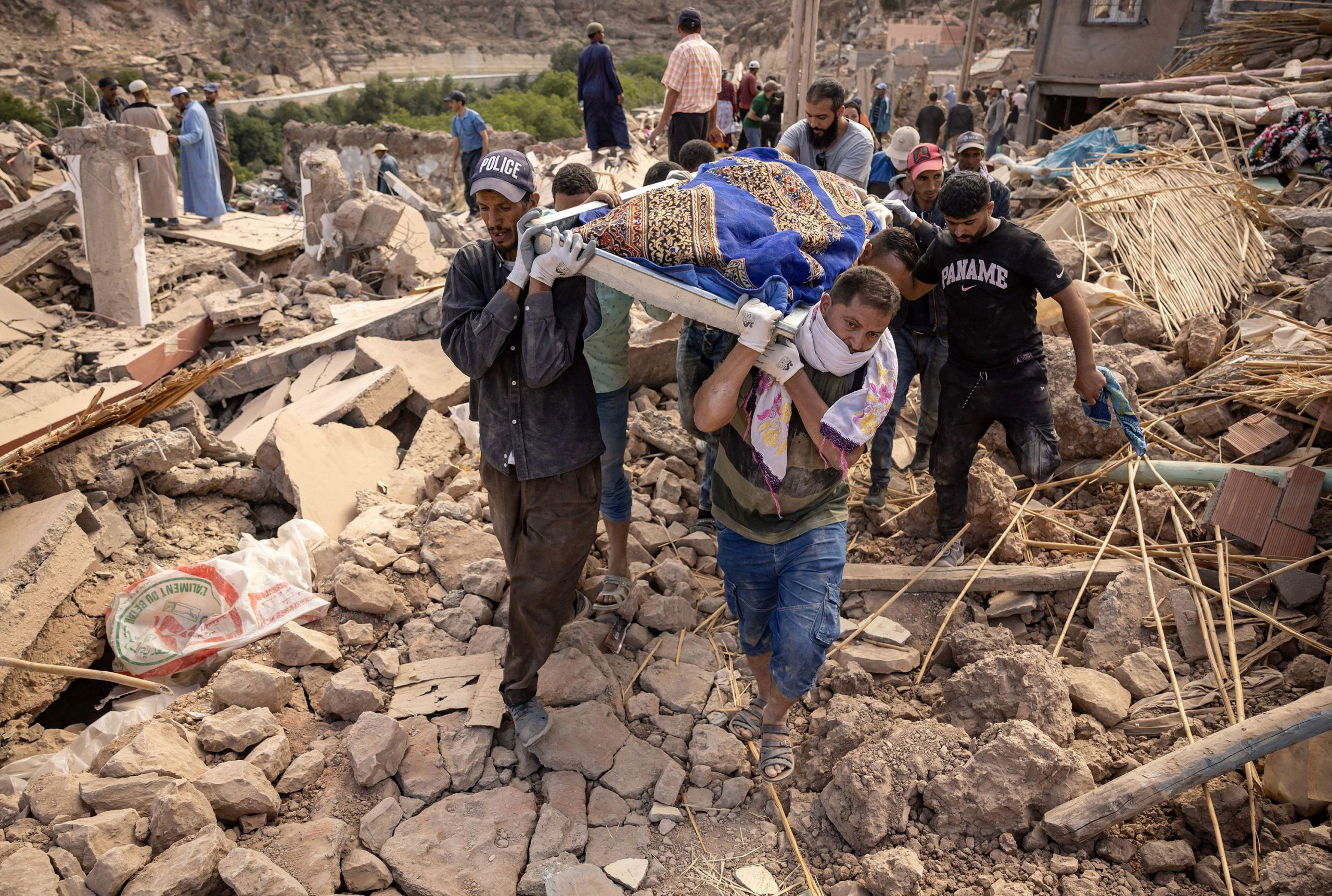
RACE AGAINST TIME TO LOCATE SURVIVORS 4 DAYS AFTER MOROCCO EARTHQUAKE
Four days after a devastating earthquake that killed more than 2,900 people—the majority of whom were in isolated towns in the High Atlas Mountains—hopes for survivors in Morocco began to fade.
Following the 6.8-magnitude earthquake late Friday, search and rescue teams from the kingdom and from overseas continued searching amid the debris of collapsed mud-brick homes for signs of life as they raced against time.
Water, shelter, health care, and sanitation services were among the “most pressing needs” listed in the Red Cross’s appeal for more than $100 million in relief for the nation of North Africa.
“We need to make sure we avoid a second wave of disaster,” said Caroline Holt, global director of operations at the International Federation of Red Cross and Red Crescent Societies.
Many families continued to sleep outside in the open, gathered in blankets on public squares in the tourist hotspot of Marrakesh, whose UNESCO-listed old quarter suffered cracks and other significant damage. This was done out of dread of aftershocks.
However, the need was greatest in isolated, impoverished mountain towns, many of which could only be reached by twisting dirt roads, where traditional adobe homes had collapsed into dust and rubble and where residents had been searching by hand for lost relatives.
Many families continued to sleep outside in the open, gathered in blankets on public squares in the tourist hotspot of Marrakesh, whose UNESCO-listed old quarter suffered cracks and other significant damage. This was done out of dread of aftershocks.
However, the need was greatest in isolated, impoverished mountain towns, many of which could only be reached by twisting dirt roads, where traditional adobe homes had collapsed into dust and rubble and where residents had been searching by hand for lost relatives.
In the mountain community of Douzrou, 80 kilometres southwest of Marrakech, about 100 people perished. Survivors now reside in temporary shelters far from their completely or severely damaged homes.
“The weather conditions here are very harsh,” said Ismail Oubella, 36, who lost three children, his pregnant wife and his mother. “We fear the worst with the coming winter.”
“We want to be relocated as soon as possible. We lost everything, even our livestock, but no one came to see us,” said Hossine Benhammou, 61, who lost nine family members in the earthquake.
Another resident, Lahcen Ouhmane, 68, said that “we are afraid of the rains that could cut the unpaved road that leads to our village. We risk starving”.
– Remote villages destroyed –
Rescuers, aid trucks and private volunteers kept travelling to stricken villages in the barren foothills of the High Atlas, many accessible only via roads affected by rockfalls.
In the village of Asni, in the worst-hit province of Al-Haouz, the army set up a field hospital with medical tents where more than 300 patients had been treated by Monday, Colonel Youssef Qamouss told AFP.
“The hospital was deployed 48 hours ago,” he said, adding that it has an X-ray unit, pharmacy and other facilities. “It started operating this morning and we’re already at more or less 300 patients.”
Many Moroccan citizens have rushed to help quake victims with food, water, blankets and other aid or by donating blood to help treat the injured, an effort joined by the national football team.
The quake was Morocco’s strongest on record and the deadliest to hit the country since a 1960 earthquake destroyed Agadir on the Atlantic coast, killing between 12,000 and 15,000 people.
Overall, at least 2,901 people have died and 5,530 been injured in the latest tragedy, according to the latest official toll issued Tuesday.
Morocco has allowed rescue teams to come to its aid from Spain, Britain, Qatar and the United Arab Emirates but so far declined offers from several other nations, including the United States and Israel.
– 100,000 children affected –
Albert Vasquez, the Spanish unit’s communications officer, warned on Monday that “it’s very difficult to find people alive after three days” but stressed “hope is still there”.
The United Nations estimated that more than 300,000 people have been affected, one third of them children, by the powerful seismic event that hit just after 11:00 pm (2200 GMT) when most families were asleep.
“Thousands of homes have been destroyed, displacing families and exposing them to the elements at a time of year when temperatures drop down during the night-time,” the UN children’s agency said.
“Schools, hospitals and other medical and educational facilities have been damaged or destroyed by the quakes, further impacting children.”
The rebuilding effort is expected to be enormous for the country which is already suffering economic woes and years of drought and now fears a downturn in the crucial tourism sector.
Prime Minister Aziz Akhannouch chaired a Monday meeting on housing and reconstruction and then pledged that “citizens who have lost their homes will receive compensation,” adding the details would be announced later.
